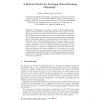432 search results - page 12 / 87 » Population and Agent Based Models for Language Convergence |
GECCO
2005
Springer
14 years 1 months ago
2005
Springer
A quality-time analysis of multi-objective evolutionary algorithms (MOEAs) based on schema theorem and building blocks hypothesis is developed. A bicriteria OneMax problem, a hypo...
LREC
2010
13 years 9 months ago
2010
Ontology population from text is becoming increasingly important for NLP applications. Ontologies in OWL format provide for a standardized means of modeling, querying, and reasoni...
ECAL
2007
Springer
14 years 2 months ago
2007
Springer
Language can be viewed as a complex adaptive system which is continuously shaped and reshaped by the actions of its users as they try to solve communicative problems. To maintain c...
EELC
2006
13 years 11 months ago
2006
Abstract. In this paper we introduce a model for the simulation of language evolution, which is incorporated in the New Ties project. The New Ties project aims at evolving a cultur...
ATAL
2004
Springer
14 years 1 months ago
2004
Springer
We describe the initial steps in developing an agentbased cognitive architecture designed to support psychologically plausible human variability. The new architecture, COJACK, is ...

